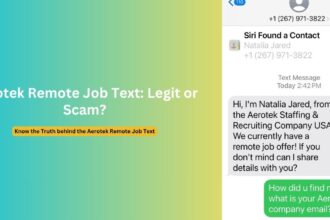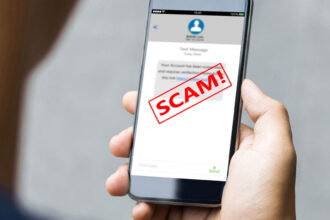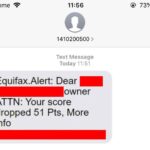Scam and phishing phone calls purporting to be from the nonprofit Feed Foundation are on the rise, preying on people’s generosity to give to what seems like a good cause. But are these calls legitimately from Feed Foundation fundraising efforts or illegal scams trying to steal your money and information?
Some users reported of receiving repeated harassing calls demanding donations even after blocking numbers, while reviews question if this charity does any actual charitable work, it’s important to educate yourself before ever giving out payment details over the phone.
Overview of the Feed Foundation Phone Call Scam
The Feed Foundation is a real 501(c)(3) nonprofit organization dedicated to raising funds to fight global hunger and malnutrition. However, their identity appears unfortunately to be used illegally in telephonic phishing schemes soliciting donations or personal information over the phone.
Numerous online complaints from the last two years describe receiving frequent, even daily calls from a variety of constantly changing phone numbers. The incoming call displays as from “Feed Foundation” due to caller ID spoofing technology allowing scammers to mask their real number.
When people answer these scam calls, the person claims to be a representative from Feed Foundation seeking donations or financial account details. Often the caller has a strong foreign accent. In the background noise, call centers can sometimes be heard. Other versions of the scandal include claims around fake grant eligibility questionnaires or lowering electric bills.
Despite users repeatedly asking to be removed from calling lists, the harassing phone calls persist from new numbers. Even reporting numbers as spam rarely stops more from coming for most victims of this donation scam.
How the Fake Spam Calls Operate
The con artists behind these illegal calls are experts in social engineering by exploiting people’s trusting nature and want to support charitable work. By hijacking a lesser-known charity’s identity like Feed Foundation versus more recognized ones like Red Cross, they bank on more folks letting their guard down.
Spoofing caller ID to display “Feed Foundation” tricks unsuspecting users into assuming the call is legitimate. High pressure tactics insist the donation opportunity is extremely time sensitive and exclusive, hoping people act emotionally versus logically. Playing further on heartstrings are claims donations will help save starving children or support veterans programs.
When gullible individuals eventually provide credit card or banking details, the criminals quickly steal as much money as possible before raising suspicions. Even just surrendering key personal data like SSNs or account numbers sets victims up for future identity theft-based fraud. Some variations have users directed to fake donation websites to enter information directly.
For users offering small donations by check, scammers may request large processing “fees” upfront before that meager check ever gets cashed or deposited. Or they string out the interaction asking for a little more each time by inventing new needs or emergencies requiring immediate funding.
User Complaints Reveals The Bitter Truth
Analysis of various third-party consumer complaint sites reveals many negative user testimonials about receiving illegal and harassing calls falsely tied to Feed Foundation fundraising efforts. These user reviews repeatedly cite telltale patterns:
- Frequent phone calls coming from a wide range of spoofed phone numbers
- Strong foreign accents indicating overseas illegal call center operations
- High pressure tactics insisting on immediate donations
- Requests for sensitive financial or personal data
- Refusal to stop calling after placing numbers on do not call registries
- Ongoing calls after reporting specific numbers as spam
In addition to recounting frustrating scam attempts through these phone calls, user complaints also question whether the Feed Foundation itself runs any legitimate charitable operations versus acting as a front group for fraudulent fundraising. With some reviews digging into their financials, concerns emerge about lack of transparency and minimal funds going to actual programs fighting hunger.
However, it’s unlikely the registered US charity is directly responsible for the illegally spoofed telemarketing calls extracting donations or personal information. More probable is international criminals are hijacking the Feed Foundation identity and tax-exempt nonprofit status to lend credibility for their own phishing schemes. Still, the impacted charity could be more proactive in sending cease and desist letters to the scammers while alerting authorities.
Is Feed Foundation a Legitimate Charity?
According to GuideStar and other nonprofit charity tracking services, Feed Foundation (aka “The FEED Foundation”) holds a legitimate 501(c)(3) designation and remains legally registered as a tax-exempt public charity.
Founded originally in 2008 by Lauren Bush Lauren, granddaughter of President George H. W. Bush, the organization’s stated mission focuses on supporting other programs fighting global hunger and malnutrition. Financials show funds go predominantly to UN World Food Programme efforts with smaller amounts for their own Student Feed Campaign.
However, as a smaller direct service charity reliant almost entirely on private contributions, Feed Foundation collects limited revenue and operates without paid staff or much overhead. This makes tracking how efficiently donations translate to boots-on-the-ground relief programs challenging. Their slim operations also do little to combat scam callers illegally using their identity in telephonic phishing schemes.
So the Foundation deserves benefit of doubt as an above-board charity itself. But those considering donating may want to research other options with greater transparency, higher marks from charity evaluators on how funding gets used, and less vulnerability for scammers to exploit illegally.
How to Avoid The Feed Foundation Spam Donation Telecall
When receiving a suspicious call soliciting donations and claiming affiliation with Feed Foundation or other charities, use caution before providing any sensitive information over the phone. Keep the following tips in mind:
- Let all calls from unknown numbers go to voicemail first so you can screen for red flags
- Never make snap decisions for donations or providing data – sleep on any requests
- Confirm legitimacy by calling charity directly via numbers on their official site
- Ask specific questions about identity of caller and exact nature of the nonprofit
- Request written information be mailed rather than giving personal details
- If something feels “off,” hang up! Report number to “Do Not Call” registries
No legitimate charity will pressure or rush people into immediate donations without chance to vet the opportunity first. Nor should they request sensitive financial or identity information over the phone out of the blue.
Protect yourself moving forward by signing up for anti-spoofing apps or services from phone carriers. These will alert you to likely scam calls with “potential spam” warnings if the number doesn’t match caller ID name.
What to Do If You Fall in the Scammers Trap
If you already fell victim to the Feed Foundation donation scam calls and surrendered financial account or social security numbers, take action immediately:
- Call banks/credit card companies to freeze accounts and monitor for fraud
- Change online account passwords and security questions in case compromised
- Sign up for credit monitoring to catch unauthorized new lines of credit
- File reports with the FCC, FTC, state attorneys general about illegal spoofing
- Notify local police about any losses due to fraud for investigation
Even if no immediate fraud yet, remain vigilant by reviewing statements closely the next few months and keeping tabs on your credit reports with Equifax, Experian and TransUnion too. Security experts also advise submitting an IRS ID Theft Affidavit Form 14039 if Social Security number got compromised.
And remember – any further calls going forward likely remain scammers undaunted by previous failure. Simply hang up. The only cure for this telephonic harassment stems from collectively stopping engagement plus authorities shuttering illegal overseas call centers.
Frequently Asked Questions (FAQs)
1. How often do these Feed Foundation fraud calls happen?
Based on online user complaints, frequencies range widely from weekly to over 10 calls daily. Fight back via call blocking apps and screening unknown numbers.
2. Do scammers also use email phishing posing as Feed Foundation?
While predominantly phone calls, some versions direct victims to fake Feed Foundation donation websites to harvest entered financial data or install malware.
3. Can my number get removed from their call lists to stop this harassment?
Unfortunately scam telemarketers ignore do not call registries. But report them to the FTC plus phone carriers as spoofed spam.
4. Does Feed Foundation attempt to stop scammers misusing their identity?
No evidence exists of them actively combating these fraudulent fundraising calls. They likely need to send cease and desist orders to illegal call centers.
5. How do fraudsters keep changing numbers to bypass blocking?
Cheap VoIP technology coupled with automated dialers lets them rotate countless spoofed numbers to evade countermeasures.
The Bottom Line
In the end, the Feed Foundation remains a legal charity doing work to battle malnutrition even if some critique their impact or transparency. But their identity is clearly hijacked by sophisticated international crime rings running fraudulent telemarketing calls to collect either donations or sensitive personal data.
Do not fall for these scams by trusting any unexpected requests over the phone to give money or financial details, no matter the tip-off-the-heartstrings cause pitched. The only weapon against faceless offshore thieves is refusing to become their next victim.
Stay safe by just hanging up, then reporting the spam to multiple agencies. And consider supporting the mission of Feed Foundation directly via their legitimate website if hunger relief efforts speak to your charitable passions after conducting proper due diligence into their operations. Just make sure to carefully guard personal information to deny scammers their life






































